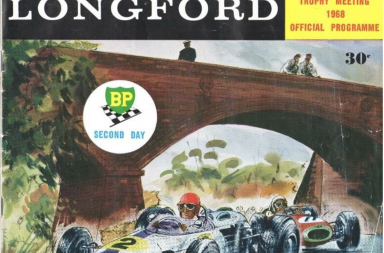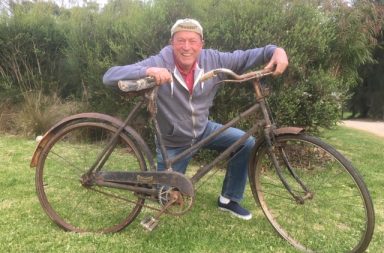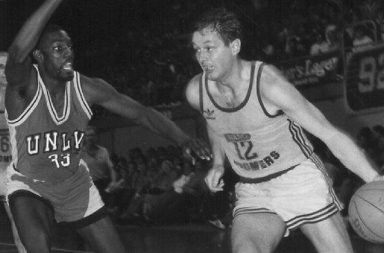By Neil Kearney
Whoever planned the back streets of my hometown must have been expecting drovers to move flocks of sheep along the wide, open thoroughfares.
Longford is an historic service town of about three thousand people in the sheep and cattle country of Tasmania’s northern midlands, 20km south of Launceston.
It was a great place to be a child in the 1960s, and I love looking back on that time.
The broad street we lived on, Hay Street, had the schoolground at one end and the tip at the other.
Many Longford kids got their first bike off the tip. Scavenging was a respectable pastime, and the men from the old men’s home sifted freely through the townsfolks’ cast-offs. I remember when one of the old men, Bill George, was asked to remove a beehive from the school grounds. It was in a blackberry bush that was tangled through a rotting paling fence. Watched by anxious girls and boys fretting and squealing, Bill was like an illusionist, carefully using sleight of hand to relocate the bees. After that, we kids really looked up to the old men.
My uncle ‘Flarty’ was a scrounger, and I inherited an old bike that he resurrected from the tip. Though I’ve shifted house more times than I care to remember, Flarty’s bike has always come with me, along with other mementoes from Longford days.
I’ve hung onto the rocking chair that Mrs Morgan gave my dad when they couldn’t fit it on the removals truck. Mr and Mrs Morgan and their tribe of twelve kids lived in a three-bedroom weatherboard on the crossroads of Hay and Smith streets. There was always something happening at the Morgans, a riot of noise and fun. When they loaded up the truck and left to go South about 1964, our street fell strangely quiet.
Fortunately, the Gray family arrived from ‘town’ (Launceston) and the bunks were full again. The corner house vibrated with the sounds of boys and girls, playing, yelling, screaming, laughing and crying.
We often played ball on the wide, open street. The town clerk, Bruce Viney, lived opposite us and he joined in our games of end-to-end footy. Bruce could kick a deadly stab pass.
At holiday time Hay Street children roamed from house to house and mothers rustled up snacks as best they could. I can still see Mrs Wise sprinkling ‘hundreds and thousands’ onto slices of white bread.
Before concrete kerb and guttering came in, the open drains were a hotbed for mosquitoes. On stifling summer nights, mozzies invaded my bedroom and feasted on my blood, until dad stormed into the bedroom, swiping madly with a towel. It was a cacophony of life and death, the mozzies whining like Messerschmitts in the Battle of Britain. My walls were so blood-stained I shudder to think if dad used that towel to dry himself.
Every winter for twenty years dad went away shearing on the mainland, and on Longford show night 1961 he landed home with a cheque big enough to buy a television set.
The opening of TNT9 Launceston was still six months away, so dad put up a forty-foot antenna to get a signal from Tasmania’s first commercial station, TVT6 Hobart.
When the wind howled at night, the antenna shook and rattled. Lying awake, wondering whether the antenna was going to crash onto the roof, was every bit as suspenseful as the Perry Mason mysteries. Our Kriesler was Hay Street’s first tv set and there were about 30 kids living in our neck of the woods. In the late afternoon the mob would spill onto our loungeroom floor to watch the Mickey Mouse Club (the Wise brothers loved Annette Funicello), The Flintstones, Gunsmoke and Bonanza.
Black and white tv sets became redundant when colour television was introduced in the ‘70s, but that old Kriesler still occupies a corner of my house, alongside Mrs Morgan’s rocker. Dad was a serial discarder – he chucked everything onto the tip – so I’ve over-compensated by hoarding keepsakes from our time on Longford.
Back in the ‘60s, there was so much to excite us – like the tingle that raced up our spines when we heard the music of a ‘Mr Whippy’ van entering the neighbourhood.
One cracker night the ever-cheerful Wally Dent organised a bonfire on the paddock opposite our house. We stoked up the heap for hours. But before we could savour the spectacle, a box of crackers somehow caught alight and our fireworks went up in a sensational burst of penny bangers and Catherine wheels.
A circus came to Longford every second year and set up on the ‘the swings and slides’ (now known as the Village Green). Once the circus people put on an elephant race from the bottom pub up the front street, with an animal handler riding one elephant and Longford’s Gary Campaign aboard the other. Gary urged his jumbo like it was one of ‘Cob’ Walker’s gallopers and the locals cheered him to victory. Imagine how the authorities would view that elephant race these days!
Life in a country town wasn’t all beer and skittles. Families battled to survive from month to month, as they still do, and I’d be gilding the lily if I said most people were contented with their lot. But kids were usually sheltered from harsh realities, and we felt safe in our community. We knew just about everyone on Longford and the town wrapped around us like a big security blanket.
I’ve never forgotten the kindness we received when mum died in 1980. Neighbours, townsfolk and storekeepers pitched in to provide support and give us a loving hand. At moments like that, you know you’re blessed to live in a country town.
My beloved auntie still lives on Hay Street and regularly gets together with the same group of Longford girlfriends she’s known for more than 70 years. Among them, Bev Dent and Bev Allan, both of whom raised their families on Hay Street.
It’s said that you should never look back, but I’ve been guilty of breaking that rule a thousand times.
Recently, I stood on the footpath outside our old home, re-imagining the Hay Street of my boyhood. The thoroughfare is still wide enough to fit a flock of sheep and the houses look much the same as they did six decades ago.
But it felt eerie. There was something different, something was missing. The realisation dawned on me – there was no noise. I couldn’t hear the beautiful sounds of boys and girls playing and calling out, crying and laughing.
That noise belonged to another time.



